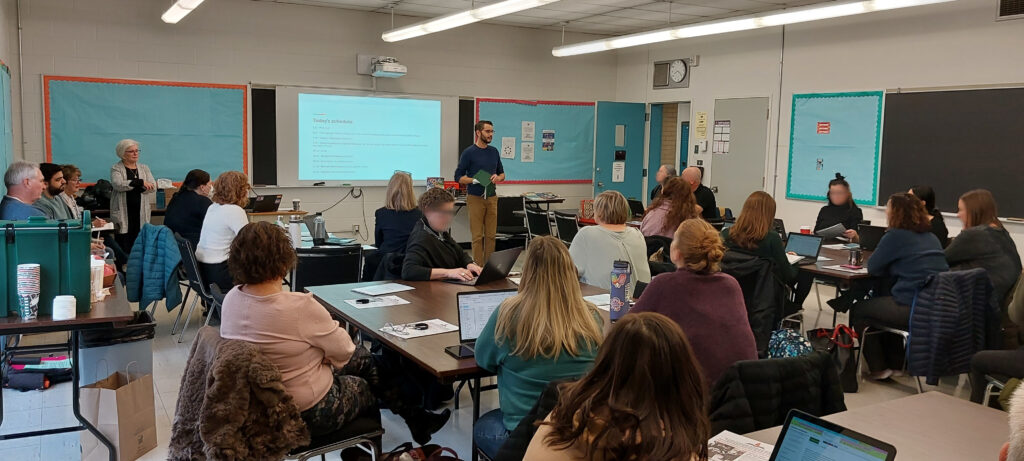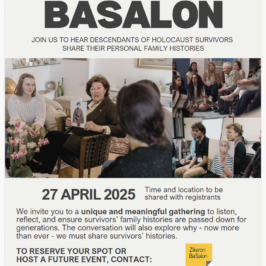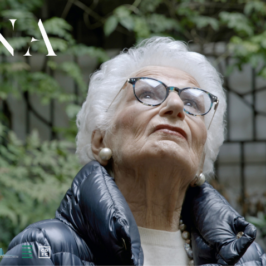
By Marion Silver
In mid-November, a two-day teachers’ workshop organized by CHES presented four sessions for 120 Grade 6 educators and administrators. CHES’ partners in the initiative were the Azrieli Foundation, Yad Vashem International School for Holocaust Studies in Jerusalem, and the Ottawa Carleton District School Board (OSDSB).
Brian Kom, the OCDSB’s Jewish Equity Instructional Coach in the Equity, Inclusion, and Anti-Oppression team, facilitated the workshops which provided teachers with first-hand insight into teaching tools, techniques, resources, and classroom ideas.
Brian and the OCSDB Holocaust Education Working Group of Jessica Sutherland, Kami Francis, and Patrick Mascoe, created an open and welcoming safe space for teachers to discuss their own classroom hurdles. Classroom-ready resources were prepared simultaneously during the sessions and aimed to meet the needs of participating teachers.
CHES Chair Mina Cohn, explained the importance of teaching the Holocaust and introduced Ted’s Story, the new CHES lesson plan that follows the requirements of the new Grade 6 curriculum. It introduces students to the experiences and contributions of Canadian Jewish communities to the country, describes the impact of antisemitism on these communities, and compares Canadian immigration policy during the war years to today’s more welcoming approach. Based on authentic Holocaust testimony which has ties to Cohn’s own family, Ted’s Story details the experience and survival story of Ted Ingberg as a seven-year-old boy in Nazi-occupied Poland, his eventual acceptance in 1947 into the Canadian War Orphans project, and his subsequent life in Canada. Download Ted’s Story lesson plan here. Additional lesson plans are available on the CHES website.
Yoni Berrous, Head of Education and Training at Yad Vashem, joined the workshops remotely. He stressed that teaching the Holocaust in Grade 6 should start with a focus on stories of individuals. As children mature, the teacher may introduce a survival story of a family. Discussing communities should come at a more mature age. He showed teachers how to prepare their class to study the Holocaust and suggested using animated videos. Yoni explained that an animated video provides an opportunity to offer visual details that might be missing in a story. He outlined pitfalls and offered excellent short film choices for different age ranges, including The Story of Simcha.
Marc Olivier-Cloutier, Manager of Education Initiatives for the Azrieli Foundation, presented several essential resources for including 126 memoirs and wartime diaries. The program, “Hearing History: A Holocaust Survivor Memoir Read Aloud”, includes Escape from the Edge by Morris Schnitzer who lives in Ottawa and In Hiding by Marguerite Quddus who is from Montreal, both of which are suitable for Grade 6 students. Also offered by the Foundation are numerous bilingual tools and resources.
The educators were urged to use special dates such as Raoul Wallenberg Day on January 17th, International Holocaust Remembrance Day on January 27th, Canadian Jewish Heritage Month in May, and Holocaust Education Month each November as an opportunity for teaching about the Holocaust.
Teachers’ request for a one- week sample lesson plan was met, and a Google Doc was created with resources from the OCDSB Holocaust Committee, CHES, Yad Vashem, and the Azrieli Foundation. The Google Doc resources are available to all OCDSB teachers through their school portal.
Marion Silver is the CHES Secretary.






